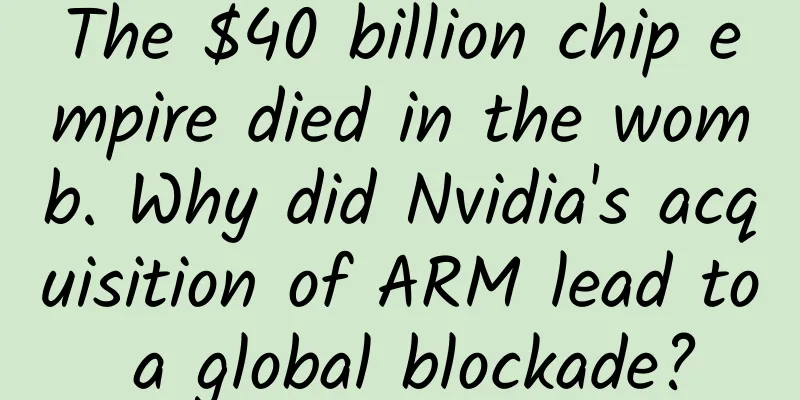The $40 billion chip empire died in the womb. Why did Nvidia's acquisition of ARM lead to a global blockade?

|
Nvidia's acquisition of chip design company ARM can be regarded as one of the biggest news in the technology industry in 2020. But now this stunning merger is likely to fail. When the acquisition news came out, Nvidia announced that the acquisition price was expected to be around US$40 billion. However, while the outside world was shocked, many analysts had already questioned the prospects of this deal. The reason is simple: to complete this deal, it needs the approval of regulatory authorities in China, the United States, the European Union, and the United Kingdom. In the context of countries around the world paying more and more attention to antitrust, this deal is likely not to be approved. Now, with less than two months left before the original transaction deadline, the acquisition story has not yet been finalized. It seems that things are developing in the worst direction expected, and Nvidia itself seems to be ready for the deal to fall through. According to people familiar with the matter, Nvidia has recently informed its partners that the deal is likely to not be completed. As analysts expected, the biggest resistance to the acquisition came from regulators. In July last year, the UK antitrust department said in a report that Nvidia's acquisition of ARM could have a "worrying" impact on the UK's national security; in December, the US Federal Trade Commission filed a lawsuit against Nvidia. Both the UK, where ARM is located, and the US, where Nvidia is located, have expressed opposition to the acquisition to varying degrees, and the deal is likely to fall through. The reason why this transaction has attracted such great regulatory pressure is largely due to ARM's special status. Today, ARM architecture chips have been used in mobile phones, computers, cars and even many factory equipment. Giants such as Apple, Qualcomm, Samsung, Huawei, and MediaTek need to obtain ARM's authorization when producing chips. The basis for ARM's business model to operate to this day is its neutrality - ARM only designs architectures, does not produce chips, and therefore will not compete with any of the above companies. Nvidia's entry will change all this. Nvidia itself is one of the world's largest chip companies and is in competition with many of ARM's customers. Therefore, once ARM completely falls under Nvidia's control, its neutrality will most likely not be maintained, and the world's largest technology companies may also fall into a completely passive position when facing Nvidia. Therefore, some industry insiders initially evaluated this transaction as "Nvidia's blessing and the chip industry's sorrow." Naturally, the tech giants collectively opposed the acquisition. Qualcomm, Microsoft, Intel, Amazon and other companies formed an alliance, and according to people familiar with the matter, this alliance provided regulators around the world with "enough ammunition to kill the deal." It can be said that, apart from Nvidia and ARM, neither peers in the technology industry nor governments are happy to see this acquisition happen. Although the two companies still claim that the deal has great positive significance and still hope to facilitate the merger, from various perspectives, these remarks are likely to be just a "death struggle." In fact, for Nvidia, even if the deal ultimately fails, it will not have much impact on them. First of all, from a financial point of view, Nvidia is now in its heyday. The company's latest financial report shows that in the third quarter of fiscal year 2022, the company's total revenue reached US$7.1 billion, a year-on-year increase of 50%; net profit was US$2.464 billion, a year-on-year increase of 84%. The gaming business and the mining boom have made Nvidia a lot of money, and its market value has also increased from US$340 billion in August 2020 to more than US$800 billion today. From a business perspective, whether the acquisition is successful or not will not disrupt Nvidia's existing layout plans. An analysis shows that: "ARM will be a valuable asset for Nvidia, but it is not a necessity. The addition of ARM can greatly promote Nvidia's data center chip research and development, but regardless of whether the acquisition is successful or not, Nvidia should be able to and will continue to promote related work." The media also revealed that the agreement between Nvidia and ARM stipulates that if the acquisition fails, at least $1.25 billion of the $2 billion Nvidia prepaid to ARM will not be returned, but Nvidia will obtain an architecture license. In other words, even if the transaction ultimately fails, Nvidia will still be able to develop its own CPU architecture without paying a licensing fee. In fact, for Nvidia, this transaction can put itself in a more advantageous position anyway. But for ARM and its current owner SoftBank, the situation is not so optimistic. SoftBank agreed to sell ARM because it lacked a stable cash flow. If ARM does not get Nvidia's investment, it will be difficult for it to gain an advantage in the long run in the data center market in competition with rivals such as Intel and RISC-V. Perhaps allowing ARM to seek an IPO is a good way to solve the current dilemma. After all, the chip industry still has great appeal to many investors. However, some analysts also said that the current chip market is at a turning point. The United States, Japan, Europe and other places are expanding chip production capacity and focusing on more mature processes. This means that the chip industry is likely to be in a state of overcapacity in 2023, 2024 and even longer, and there will be a situation of oversupply. The market outlook is not optimistic. Another way for ARM to save itself is to find other smaller companies to acquire or invest in it. Qualcomm has publicly stated that if Nvidia's acquisition fails, it will increase its investment in ARM together with companies in related fields. However, this illusory promise is unlikely to provide substantial help to ARM. The more realistic situation is that if companies that can afford $40 billion try to acquire ARM, they will probably face similar regulatory issues as Nvidia; and most companies that will not bring unfair competition do not have the ability and motivation to take over ARM. It can be seen that for ARM, it would be ideal to be acquired by Nvidia, but if this is not feasible, ARM may only be able to choose one of the options with lower returns. Nvidia and ARM both have important and special positions in the chip industry, which has led to the acquisition being pursued and blocked by all parties. From a big picture perspective, even if this deal fails, it will not have much impact on other companies' direct mergers and acquisitions. However, the strengthening of antitrust measures and the refinement of supervision in various countries have been revealed. In recent years, Qualcomm's acquisition of NXP Semiconductors, Visa's acquisition of Plaid, and Microsoft's acquisition of Nuance have all been subject to strict supervision, and the first two acquisitions have been declared terminated. In fact, as the anti-monopoly trend continues to rise around the world, Nvidia will certainly not be the first nor the last technology giant whose ambitions are dragged down by lengthy review processes. As a winner of Toutiao's Qingyun Plan and Baijiahao's Bai+ Plan, the 2019 Baidu Digital Author of the Year, the Baijiahao's Most Popular Author in the Technology Field, the 2019 Sogou Technology and Culture Author, and the 2021 Baijiahao Quarterly Influential Creator, he has won many awards, including the 2013 Sohu Best Industry Media Person, the 2015 China New Media Entrepreneurship Competition Beijing Third Place, the 2015 Guangmang Experience Award, the 2015 China New Media Entrepreneurship Competition Finals Third Place, and the 2018 Baidu Dynamic Annual Powerful Celebrity. |
>>: Hackers can steal your data even if you are offline
Recommend
12 skills you need to become a millionaire
[[156527]] If you want to be a millionaire, you n...
Former PM Director of NetEase: Design experience in mobile Internet product login, registration, new user guidance, and layout
Introduction: Guo Ziwei, former director of NetEa...
Teach you how to create a live broadcast room for hot products, how to use a hundred yuan to build a live broadcast room for thousands of people and increase natural transactions
Teach you how to create a live broadcast room for...
How can Samsung remain surviving despite facing three major controversies: product, company and politics?
If it were any other company that encountered mul...
Xiaomi, Huawei, and OPPO are in a "group fight", while Hammer and Meizu have a hard time "surviving"
[[250715]] Sun Tzu said: Therefore, the method of...
Baidu Information Flow White Paper | Three steps to teach you how to use Baidu Information Flow creatively
This one article is worth ten. Mobile application...
Honor X10 takes the lead in Everest, completes 5G test with full signal and stable signal: peak value reaches 1617Mbps
To commemorate the "60th Anniversary of Chin...
Professor Yue Gu of Shanghai International Studies University: The Ultimate Spoken English Course
Professor Yue Gu of Shanghai International Studie...
Is a golf ball a mushroom? Yes, it is a rare mushroom
In Kew Gardens, located in the southwest suburbs ...
Five software development trends for 2020
Over the past few years, a lot of software develo...
How does a new website build its own keyword library?
Having worked on websites for many years, I attac...
Record design software installation video, earn 100+ projects a day
Today I want to share with you a project suitable...
Nutritional comparison of 22 kinds of nuts, you will never guess the first one!
During festivals, nuts are the most popular snack...
Thought it was a stomach bug? No, it could be pancreatic cancer knocking on the door!
Have you ever diagnosed yourself as having a stom...
How Rice and Arabidopsis Change After 120 Days of Space Travel
On December 4, rice and Arabidopsis seeds that ha...









